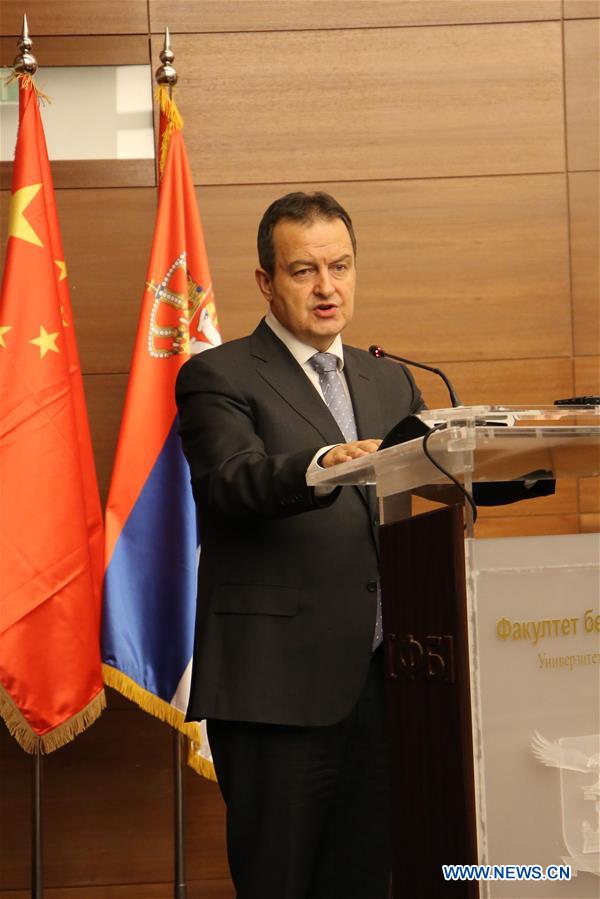 ?
?Ivica Dacic, first deputy prime minister and foreign minister of Serbia, addresses the opening ceremony of the 3rd international scientific conference "One Belt, One Road -- Serbia and the Initiative 16+1" in Belgrade, Serbia, April 19, 2019. Concerns of the European Union (EU) over the strengthening of the China and Central and Eastern European Countries (CEECs) cooperation were unjustified, Ivica Dacic said on Friday. The 3rd international scientific conference "One Belt, One Road -- Serbia and the Initiative 16+1" gathered academics, businessman and officials from China, Central and East European countries, as well as Russia. (Xinhua/Namenja Cabric)
BELGRADE, April 19 (Xinhua) -- Concerns of the European Union (EU) over the strengthening of the China and Central and Eastern European Countries (CEECs) cooperation are unjustified, said Ivica Dacic, First deputy Prime Minister and Minister of Foreign Affairs of Serbia, on Friday.
Highlighting the importance of regional ties with China for Serbia's reindustrialization, the Serbian official made the remarks at the opening of the 3rd international scientific conference "One Belt, One Road -- Serbia and the Initiative 16+1", which gathered academics, businessman and officials from China, Central and East European countries, as well as Russia.
According to Dacic, concerns of the EU officials in Brussels over China's cooperation with the region that were voiced after the recent eighth China-CEEC leaders' meeting in the Croatian city of Dubrovnik are guided by double standards, because Western European countries are never being criticized for their fruitful ties with China.
"The goal of every country's foreign policy is to work in the best national interest, and that is precisely why we are going to continue to perpetuate close ties with China," said Dacic.
Vladimir Cvetkovic, Dean of the Faculty of Security Studies of the University of Belgrade, said on behalf of the organizers of the international scientific conference that the previous two editions of the conference focused on the political and economic aspects of the Belt and Road Initiative (BRI) seen from the perspective of Balkan countries and the CEE countries. According to Cvetkovic, this year it will focus on "exclusive experiences of Serbia in the implementation of this project".
Aleksandar Antic, national coordinator for the China-CEEC cooperation, who is also the Minister of Mining and Energy said that Serbia will continue to be a locomotive of the China-CEEC cooperation.
He said that the joint projects in the field of transport, infrastructure, railway and energy made China a major partner in Serbia's reindustrialization.
Xu Jian, vice-chairman of China Foundation for International Studies (CFIS) estimated that the just concluded eighth China-CEEC leaders' meeting in the Croatian city of Dubrovnik fueled the diverse cooperation between participant countries with new energy and resulted in numerous projects in the CEE region.
He opposed accusations that the China-CEEC cooperation "divides Europe", pointing out that China supports European integration process and welcomes a united and prosperous Europe.
"16+1 is an important and useful part of China-EU relations, and by aiding development of CEE countries, it helps to reduce the economic gap between the region and the EU, while at the same time promoting balanced development and acceleration of European integration," he said.
According to Chinese Ambassador to Serbia Chen Bo, trade exchange between China and the CEECs increased by 50 percent since the launching of the China-CEEC cooperation mechanism, while investments tripled.
The international scientific conference at the Faculty of Security Studies also hosted a photo exhibition themed "Our Silk Road", displaying some 60 works by photographers from participant countries of the BRI.











